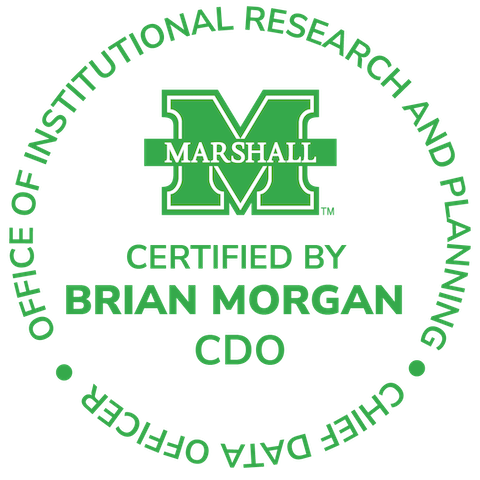
I am both honored and thrilled to have recently transitioned into the role of the Vice President for Institutional Research and Planning AND Chief Data Officer at Marshall University, especially at this transformative moment for higher education. I have been fortunate to serve my institution in many capacities during the last 26 years, but none may be as important or pivotal as this. As the digital era and changing landscape of higher education unfolds daily, one thing has become abundantly clear: the power and potential of data. Today, I’d like to address a topic close to my heart and mission – the importance of data literacy.
When we discuss literacy, we often think of the ability to read and write. Data literacy, though sharing a similar foundational essence, is the capability to read, comprehend, and craft stories from data. In higher education, this skill set is crucial not just for our research endeavors but also for every decision we make, every program we introduce, and every challenge we tackle.
Why is Data Literacy Critical for Higher Education?
- Empowered Decision Making: A university is a vast ecosystem, interconnected and vibrant. To ensure its smooth functioning, we need decisions to be informed, strategic, and impactful. With data literacy, we can discern patterns, make predictions, and carve paths that might otherwise remain hidden.
- Fueling Research: Our institution prides itself on being at the forefront of groundbreaking research. As disciplines evolve, so do the tools we utilize. In an age where data shapes many academic investigations, a deep understanding of the data aids us in extracting valuable insights, ensuring our work remains pioneering and impactful.
- Enhancing the Student Experience: Anywhere from personalized learning to understanding student outcomes, data can be our compass. However, it’s not enough to just have access to this data; we need the skills to interpret and utilize it effectively. Data is only useful when it is turned into information and that information becomes knowledge, resulting in wisdom (DIKW).
- Future-Proofing Our Institution: The world is rapidly changing, and higher education needs to keep pace. By embedding data literacy into our institution’s fabric, we are not just reacting to the present, but we are also preparing for a future where data-informed strategies will be the norm.
I believe that our journey toward a data-literate community is collective. It’s not just the domain of institutional research or a collective set of IT professionals. From the faculty to the students to our administrative staff, everyone has a role to play. Over the coming months, IRP will be introducing training sessions and resources aimed at elevating our collective data acumen.
I invite each of you to partake in this transformative journey. The promise of data is vast, and together, as a literate and enlightened community, we can unlock its potentials for the betterment of Marshall University and the broader world.
To the future, illuminated by data,
Brian M. Morgan
Chief Data Officer, Marshall University